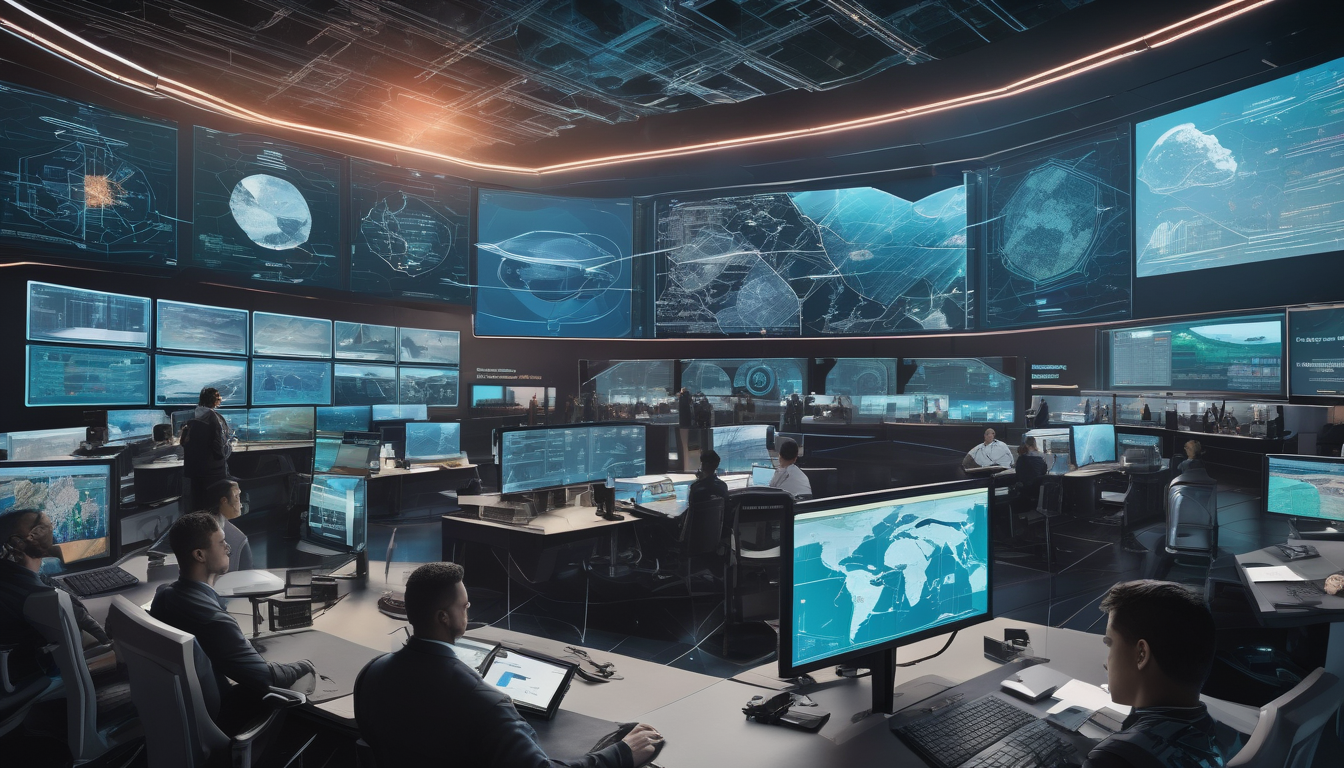In the ever-evolving landscape of technology, artificial intelligence (AI) stands out as a beacon of hope and a source of trepidation. Is it merely a figment of our sci-fi imaginations, or does it truly hold the key to solving some of humanity’s most pressing challenges? As we delve into this topic, we must consider the transformative potential of AI and how it could radically reshape our world.
Imagine a future where diseases are diagnosed within seconds, and personalized treatments are tailored to our unique genetic makeup. This isn’t just a dream; it’s a reality that AI is making possible in the realm of healthcare. With advanced algorithms analyzing vast amounts of data, AI can identify patterns that even the most trained professionals might miss. This means faster diagnoses, better treatment plans, and ultimately, improved patient outcomes. The promise of AI in healthcare is not just about saving time; it’s about saving lives.
But the potential of AI doesn’t stop at healthcare. Consider the looming threat of climate change. AI can optimize energy consumption, predict environmental shifts, and even suggest sustainable practices in real-time. Picture smart cities powered by AI that can reduce waste and enhance resource management. By leveraging AI, we could turn the tide against climate change and promote a more sustainable future for generations to come.
However, with great power comes great responsibility. As we harness the capabilities of AI, we must also navigate the murky waters of ethical considerations. Developers and users alike face moral dilemmas about how AI should be used and the implications of its deployment. Are we prepared to take on the responsibility of ensuring that AI is developed and used ethically? This is a question that cannot be overlooked as we forge ahead.
Furthermore, the rise of AI presents a paradox in the job market. While it automates mundane tasks and creates new opportunities, it also raises concerns about job displacement. What skills will the workforce need to thrive in an AI-driven world? The answer lies in adaptability and continuous learning, as we embrace the changes that AI brings.
In education, AI has the potential to revolutionize learning experiences, making them more personalized and accessible. Imagine classrooms where AI tailors lessons to individual learning styles, ensuring that every student has the opportunity to succeed. This could be a game-changer in closing educational gaps and fostering a love for learning.
Finally, as AI becomes integrated into military and security frameworks, we must grapple with the implications for global security. The potential for AI to enhance surveillance and warfare raises critical questions about safety and ethics. Are we ready to confront these challenges head-on?
In conclusion, the conversation around AI’s potential to save humanity is complex and multifaceted. It evokes both fear and hope, and as we navigate this brave new world, we must remain vigilant and proactive. The future is not set in stone; it’s ours to shape. Will we harness AI’s power for good, or will we let it slip through our fingers? Only time will tell.

The Promise of AI in Healthcare
Artificial intelligence is not just a buzzword; it’s a game-changer in the healthcare sector. Imagine a world where doctors have the ability to diagnose diseases with pinpoint accuracy within seconds, thanks to AI algorithms analyzing vast amounts of data. This isn’t science fiction—it’s happening right now! AI technologies are revolutionizing healthcare by improving diagnostics, personalizing treatments, and streamlining operations.
One of the most exciting applications of AI is in the realm of diagnostics. Traditional methods often involve time-consuming processes that can delay treatment. However, AI can analyze medical images, such as X-rays and MRIs, with incredible speed and precision. For instance, studies have shown that AI systems can detect certain cancers more accurately than human radiologists. This means earlier detection and better outcomes for patients. How amazing is that?
Moreover, AI is playing a pivotal role in personalizing treatments. With the help of machine learning, healthcare providers can tailor therapies to individual patients based on their genetic makeup and lifestyle. This leads to more effective treatments and minimizes the risk of adverse effects. For example, AI can analyze a patient’s genetic data and recommend the most suitable medications, ensuring that each patient receives the best possible care.
In addition to diagnostics and personalized medicine, AI is also streamlining operations within healthcare facilities. Hospitals are notorious for their inefficiencies, but AI can optimize scheduling, manage patient flow, and even predict staffing needs. This not only enhances the patient experience but also reduces costs. Imagine a hospital where patients are seen promptly, and resources are allocated efficiently. It’s a win-win situation!
However, while the promise of AI in healthcare is immense, it’s important to approach its integration with caution. What about data privacy? With AI systems handling sensitive patient information, ensuring data security is paramount. Developers and healthcare providers must work together to create robust frameworks that protect patient data while leveraging AI’s capabilities.
In conclusion, the potential of AI to transform healthcare is undeniable. From improving diagnostics to personalizing treatments and enhancing operational efficiency, AI is paving the way for a healthier future. As we embrace these technologies, we must also remain vigilant about the ethical implications and ensure that the focus remains on patient care. The future of healthcare is bright, and AI is leading the way!

AI and Climate Change Mitigation
Artificial intelligence is not just a buzzword; it’s a powerful tool that can help us tackle one of the biggest challenges of our time: climate change. Imagine having a super-smart assistant that can analyze vast amounts of data and provide insights that humans simply can’t. That’s what AI brings to the table! From optimizing energy consumption to predicting environmental shifts, AI is paving the way for a more sustainable future.
One of the most exciting applications of AI is in energy management. Think about how much energy is wasted in homes and businesses every day! AI systems can analyze usage patterns and suggest ways to cut down on energy waste. For instance, smart thermostats can learn your schedule and adjust heating or cooling accordingly, reducing energy consumption significantly. This not only saves money but also contributes to lower carbon emissions.
Moreover, AI can play a crucial role in renewable energy sources. By predicting weather patterns and optimizing the performance of solar panels and wind turbines, AI can enhance the efficiency of these technologies. For example, AI algorithms can forecast solar energy production based on cloud cover and temperature, allowing for better integration into the power grid. This means more clean energy and less reliance on fossil fuels!
But the benefits of AI don’t stop there. In agriculture, AI-driven solutions can help farmers make better decisions about crop management. By analyzing data from soil sensors and weather forecasts, AI can recommend the best times to plant and harvest, as well as the optimal amounts of water and fertilizer to use. This not only boosts productivity but also minimizes environmental impact.
As we delve deeper into AI’s capabilities, it’s essential to recognize that while it offers incredible potential, it also comes with challenges. The development and deployment of AI must be done responsibly. Ethical considerations, such as data privacy and algorithmic bias, must be at the forefront of AI development to ensure that these technologies serve humanity positively.
In conclusion, AI is not just a futuristic concept; it’s actively shaping our approach to climate change mitigation. By harnessing the power of AI, we can create a more sustainable world, making significant strides towards reducing our carbon footprint. The question now is: are we ready to embrace this technology and use it wisely for the benefit of our planet?

Ethical Considerations in AI Development
As we stand on the brink of an AI revolution, the ethical considerations surrounding its development cannot be ignored. Imagine a world where machines not only assist us but also make decisions that could significantly impact our lives. This prospect raises vital questions: Who is responsible for the decisions made by AI? What happens when algorithms reflect biases inherent in their creators? These are not just technical issues; they touch the very essence of our moral framework.
One of the most pressing concerns is the potential for bias in AI systems. If the data used to train these systems is skewed or unrepresentative, the outcomes can perpetuate existing inequalities. For instance, if an AI is trained on historical hiring data from a company that has a poor track record of diversity, it may inadvertently favor candidates that fit a narrow profile. This is why developers must prioritize diversity in data collection and continuously audit their algorithms for fairness.
Another critical aspect is transparency. How do we trust a system that operates like a black box? The lack of clarity in how AI reaches its conclusions can lead to skepticism and fear among users. People deserve to know how decisions that affect their lives are made. This calls for a shift towards more explainable AI, where the reasoning behind decisions is clear and understandable.
Moreover, the use of AI in sensitive areas such as law enforcement and healthcare presents unique ethical dilemmas. For example, AI-driven surveillance systems can enhance security but at the cost of privacy. The balance between public safety and individual rights is delicate and must be approached with caution. Developers and policymakers need to collaborate to establish guidelines that protect citizens while leveraging the benefits of AI.
Finally, we must consider the implications of autonomous decision-making. As AI systems become more capable, they may take on roles traditionally held by humans. This raises the question of accountability: if an AI makes a mistake, who is to blame? Is it the developer, the user, or the AI itself? These questions highlight the need for a robust ethical framework that defines responsibilities and liabilities in AI development.
In conclusion, while AI holds immense promise, its development must be guided by ethical principles that prioritize fairness, transparency, and accountability. As we navigate this uncharted territory, the choices we make today will shape the future of AI and its impact on society. Let’s ensure that this future is not only innovative but also just and equitable.

The Future of Work in an AI-Driven World
As we step into an era dominated by artificial intelligence, the landscape of work is undergoing a seismic shift. Imagine a world where mundane tasks are automated, allowing humans to focus on creativity and innovation. Sounds dreamy, right? But, as with any revolution, this transformation brings both opportunities and challenges that we must navigate carefully.
AI’s impact on the job market is multifaceted. On one hand, it can lead to the creation of new job categories that we can’t even fathom yet. For instance, roles like AI ethics compliance officer or data bias auditor are emerging as organizations seek to implement AI responsibly. On the other hand, the fear of job displacement looms large. Many workers worry that their roles may become obsolete as machines take over tasks traditionally performed by humans.
To understand this shift better, let’s break it down into some key areas:
- Job Creation: New technologies often lead to the development of new industries. For example, the rise of AI has sparked demand for data scientists, machine learning engineers, and AI trainers.
- Job Displacement: Certain sectors may see significant job losses, particularly in roles that involve routine tasks, such as manufacturing or data entry.
- Skill Transformation: As AI takes over more basic tasks, the demand for advanced skills, creativity, and emotional intelligence will increase. Workers will need to adapt and upskill to remain relevant.
Furthermore, the integration of AI in workplaces can enhance productivity. Companies can leverage AI for data analysis, improving decision-making processes and allowing for quicker responses to market changes. This means that employees can spend less time on repetitive tasks and more time on strategic initiatives.
However, this shift also raises important questions about workplace equity. How do we ensure that all workers have access to the training and resources needed to thrive in an AI-driven world? Moreover, as AI systems become more prevalent, we must address the ethical implications of relying on algorithms for hiring, promotions, and performance evaluations.
In summary, the future of work in an AI-driven world is not just about technology; it’s about people. As we embrace these changes, we must foster a culture of continuous learning and adaptability. The road ahead may be uncertain, but with the right mindset and preparation, we can harness the power of AI to create a more innovative and equitable workplace.

AI in Education: Enhancing Learning Experiences
Artificial Intelligence is not just a buzzword; it’s a game changer in the world of education. Imagine a classroom where every student’s unique learning style is catered to, where teachers can focus on inspiring creativity rather than managing administrative tasks. AI is making this vision a reality by providing personalized learning experiences that adapt to the needs of each student.
One of the most exciting aspects of AI in education is its ability to analyze vast amounts of data. This means that AI can identify patterns in student performance, helping educators understand which teaching methods work best. For instance, AI-driven platforms can assess a student’s strengths and weaknesses, allowing for tailored lesson plans that target specific areas for improvement. This not only boosts academic performance but also enhances the overall learning experience.
Moreover, AI can facilitate interactive learning environments. Through tools like chatbots and virtual tutors, students can receive instant feedback and support outside of traditional classroom hours. This 24/7 availability empowers learners to take charge of their education, fostering a sense of independence and motivation. Imagine a student struggling with math, who can engage with an AI tutor at any time, receiving explanations and practice problems tailored to their level. This kind of accessibility is revolutionizing how we think about learning.
Additionally, AI is playing a crucial role in making education more inclusive. For students with disabilities, AI technologies can provide customized resources that cater to their specific needs. For example, speech recognition software can help those with writing difficulties, while AI-powered reading tools can assist students with visual impairments. The goal is clear: to ensure that every learner has the opportunity to succeed, regardless of their challenges.
However, as we embrace these innovations, we must also consider the ethical implications. Data privacy is a significant concern, as educational institutions collect sensitive information about students. It’s vital for schools to establish robust policies that protect this data while leveraging AI to enhance learning. Striking a balance between innovation and responsibility is crucial.
In conclusion, the integration of AI in education is not merely about technology; it’s about transforming how we teach and learn. With its potential to personalize education, enhance accessibility, and streamline administrative tasks, AI is paving the way for a brighter future in education. As we move forward, embracing these tools while remaining vigilant about their ethical use will be key to unlocking their full potential.

AI and Global Security Challenges
As we delve into the realm of artificial intelligence, one cannot overlook its profound implications on global security. The integration of AI into military and security frameworks is a double-edged sword, offering both unprecedented advantages and formidable risks. On one hand, AI can enhance national defense capabilities through advanced surveillance systems and predictive analytics, enabling governments to anticipate and mitigate threats before they escalate. On the other hand, the very technologies designed to protect us can also be weaponized, leading to a new era of warfare that is faster, more complex, and less predictable.
Imagine a world where autonomous drones patrol borders, equipped with AI algorithms that can identify potential threats in real-time. This scenario is not far-fetched; in fact, many nations are already investing heavily in such technologies. The ability to process vast amounts of data quickly allows AI to provide insights that human analysts could only dream of achieving. However, this raises a critical question: what happens when these systems malfunction or are hacked? The potential for catastrophic outcomes is alarming, and it highlights the urgent need for robust ethical guidelines and oversight in AI development.
Moreover, the use of AI in surveillance has sparked a heated debate about privacy and civil liberties. Governments can monitor citizens more efficiently than ever before, creating a chilling effect on freedom of expression and dissent. The balance between security and individual rights is delicate, and as AI technologies evolve, so too must our understanding of their implications. To tackle these challenges, a collaborative approach involving policymakers, technologists, and ethicists is essential. Together, they can establish frameworks that ensure AI is used responsibly and transparently.
In summary, while AI presents remarkable opportunities for enhancing global security, it also poses significant challenges that must be navigated with caution. As we embrace these innovations, it is imperative to remain vigilant about the ethical and societal implications they bring. The future of security in an AI-driven world will depend not only on technological advancements but also on our collective ability to govern these tools wisely.

Public Perception of AI: Fear vs. Hope
The conversation surrounding artificial intelligence (AI) is a fascinating blend of fear and hope. On one hand, we have the optimists who see AI as a powerful tool that can solve some of humanity’s most pressing challenges. Think about it: AI has the potential to revolutionize healthcare, improve education, and even combat climate change. These advocates argue that, with the right approach, AI can enhance our lives in ways we can only dream of.
On the flip side, there are the sceptics who voice legitimate concerns about the implications of AI. They worry about job displacement due to automation, the ethical dilemmas surrounding AI decision-making, and the potential for misuse in surveillance and warfare. In fact, according to a recent survey, nearly 60% of respondents expressed concern over AI’s impact on their jobs. This fear is not unfounded; as AI continues to evolve, the landscape of employment is shifting dramatically.
So, what fuels this dichotomy in public perception? It often boils down to media portrayal and personal experience. Movies and TV shows frequently depict AI in dystopian scenarios, which can skew public perception towards fear. However, positive stories about AI enhancing lives, like AI-driven diagnostics saving lives or personalized learning experiences in education, can inspire hope. It’s a classic case of how narratives shape reality.
Moreover, the age demographic plays a significant role in how people perceive AI. Younger generations, who are more tech-savvy, tend to be more optimistic about AI’s potential. In contrast, older individuals may be more cautious, often viewing technology as a threat rather than an opportunity. This generational divide illustrates how our backgrounds and experiences shape our views on technology.
To better understand this complex relationship, consider the following table that summarizes key factors influencing public perception of AI:
| Factor | Fear | Hope |
|---|---|---|
| Job Displacement | High concern | New job creation |
| Ethical Dilemmas | Worry about misuse | Potential for fairness |
| Impact on Daily Life | Loss of privacy | Enhanced convenience |
In conclusion, the public perception of AI is a complex tapestry woven from threads of fear and hope. As we continue to navigate this evolving landscape, it’s crucial to foster open dialogues that address concerns while highlighting the immense potential AI holds for a brighter future. After all, isn’t it better to embrace the possibilities than to be paralyzed by fear?
Frequently Asked Questions
- What are the main benefits of AI in healthcare?
AI enhances healthcare by improving diagnostics, personalizing treatment plans, and optimizing operational efficiency. Imagine a world where your doctor has an AI assistant that can analyze your medical history in seconds, leading to faster and more accurate diagnoses!
- How can AI help combat climate change?
AI plays a crucial role in climate change mitigation by optimizing energy consumption, predicting environmental shifts, and facilitating sustainable practices. Think of AI as a smart navigator, steering us towards a greener future by making data-driven decisions.
- What ethical concerns arise with AI development?
As AI technologies advance, ethical dilemmas surface, such as biases in algorithms and the potential for misuse. It’s essential for developers and users alike to consider the moral implications of their creations, ensuring that AI serves humanity positively.
- How will AI impact the job market?
AI is transforming the workforce by automating tasks and creating new job opportunities. While some jobs may become obsolete, new roles will emerge, requiring different skills. It’s like a game of musical chairs—some may lose their seats, but new ones will open up!
- Can AI enhance learning experiences in education?
Absolutely! AI can personalize education by adapting learning materials to individual student needs, making education more accessible and effective. Imagine a tutor that knows exactly how you learn best and tailors lessons just for you!
- What are the security implications of AI?
The integration of AI into military and security frameworks raises significant concerns, including the potential for increased surveillance and automated warfare. It’s a double-edged sword—while AI can enhance security, it also poses risks that need careful management.
- Why do opinions on AI vary so widely?
Public perception of AI is influenced by media portrayals, personal experiences, and the rapid pace of technological change. Some view AI as a beacon of hope for solving global issues, while others fear its implications. It’s a classic case of seeing the glass half full or half empty!


